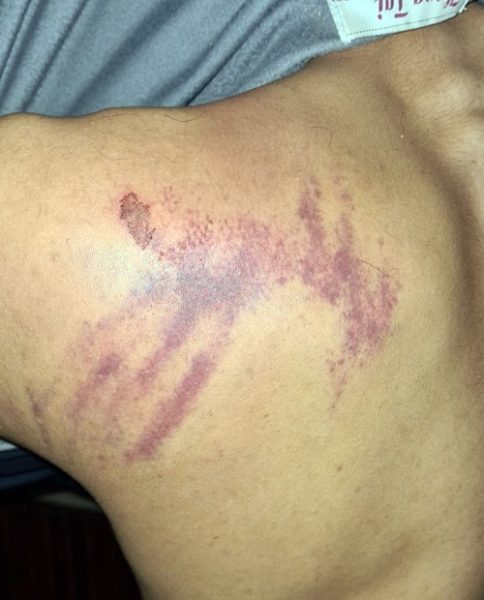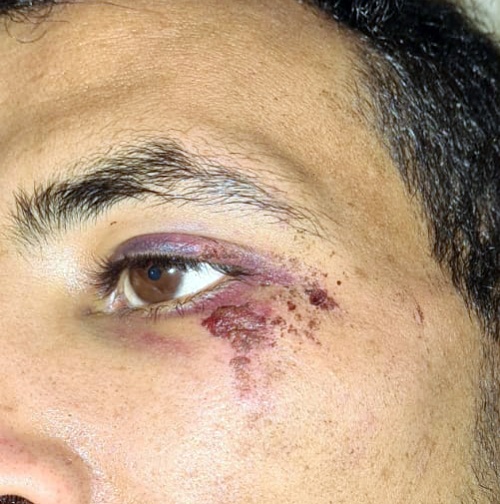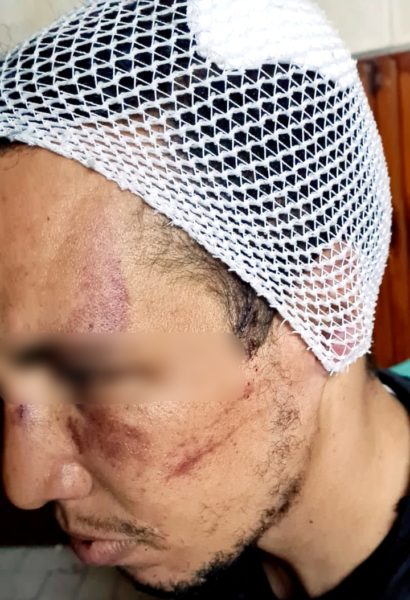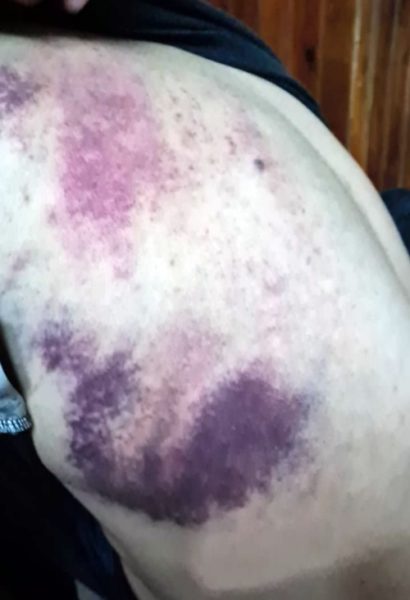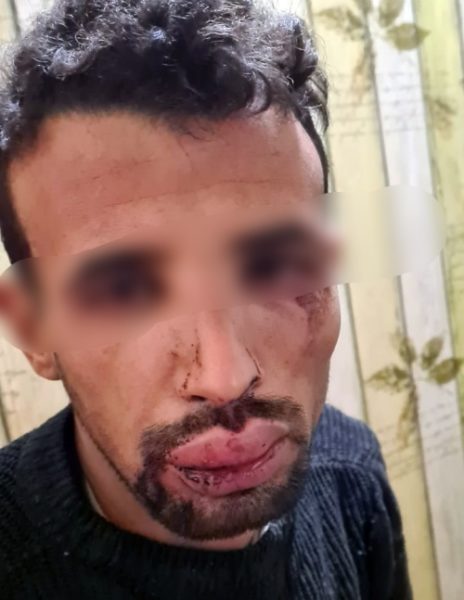Sometimes they hit you with the baton, for nothing. Just like that. For having fun maybe.
| 14.11.2020 | Dilofos/Kapikule | josoor | 41.6888877, 26.3912748 | Greece | Turkey | yes | yes | yes | yes | no | no | 9 - 60 | 90 | Afghanistan, Pakistan, Syria, Iraq, Morocco, Algeria, Tunisia | detention, no translator present, denial of access to toilets, denial of food/water | 30 | beating (with batons/hands/other), insulting, water immersion, threatening with guns, theft of personal belongings, deliberate stepping on arms | 5 in Greek police uniform, 15-20 “masked men” wearing balaclavas most Greek but one speaking Italian and two speaking Arabic, four in green uniform; unknown number of Turkish soldiers |
The respondent and a group of five men (Tunisian, Palestinian, Syrian and Libyan) crossed the Evros river at several different points close from Edirne city and gathered again on the Greek side. They walked for one day and night and passed several villages until they found a place to sleep in a forest. On the 13th of November, they were just about to turn on their phones to see on a map where they were but within a few seconds, six men carrying guns surrounded them and asked them who they were and what they were doing there. Some of them were wearing Greek police uniforms, some were not wearing official uniforms but black clothes. They had arrived in a black car. The group was ordered to get on the ground. “You are refugees? What are you doing here!”, the armed men proclaimed as they started hitting them with batons. The respondent describes how the officers hit him and the other four on their backs and arms and even told them to lie down on the ground with their arms stretched out and proceeded to walk over their arms and hands. The officers then took their phones and all other belongings.
“One of them talked to us in English. One of the guys in our group speaks Italian and one of the other officers spoke Italian to him.”Then, two more cars arrived. It was between 10 and 15 officers in total at this point.
“Some of them carried flashlights and put them in our faces to see who we are. They kept asking us for our nationalities. Then, as always, they started to hit us while putting us in the car.”They drove for around two hours, maybe less. They then arrived at a detention site and appeared to be an official police prison. The group was searched and forced to undress. They were subsequently taken into a room which was empty at the time of their arrival and which the respondent describes had a really bad stench. There were no mattresses or anything to rest on. After two hours, more people were brought in. Every hour or two hours, the door opened and more people were taken in. At the end, forty or fifty people were gathered. The officers at the detention site were dressed in green uniforms. Some spoke English but not well. The people in the room were very hungry and thirsty and kept asking for food. There were also several toddlers who were hungry. They did not receive food or water and were kept there for one day and night, a bit more than 24 hours. When there were more than thirty people, the room was so crowded that the people inside could not move anymore. All of them had to stand and yet it was too crowded. Among the people detained there were many nationalities. Pakistani, Afghans, Syrians, Tunisian, Algerian, Moroccan, Iraqi and possibly others. There were also several women and children. Some were as young as two and three years, others up to 15. There was also one old man, the respondent estimates his age to be around 65 years.
“I don’t remember how many children there were in total. Many. We tried to help this one family with four kids. The eldest was 10, the youngest two years old. There was even a baby, nine months or ten months old.”They were detained for more than 24 hours, then some cars arrived. “Again, they beat us with batons while telling us to get into the cars.” On the 14th of November, officers were wearing normal clothes and black balaclavas in three big cars, rather vans. They put a lot of people inside them. In the van the respondent was forced to enter, there were between 20 and 30 people. “It was too much, way too much!” he proclaims. There had been two rooms filled with people in that detention site and so there were many people in all three cars. “They humiliated us. They told us ‘you are animals, you deserve this’ while they put us in the cars.” They drove for around one hour until wthey arrived at the point of pushback, close from the Evros river. All of the three cars arrived there and one big military truck. There were many officers there. Some were wearing normal clothes, some green uniforms. The soldiers told people to get down, make a line and be quiet – “as always” says the respondent.
“Sometimes they hit you with the baton, for nothing. Just like that. For having fun maybe.”There were at least five soldiers and at least ten men wearing balaclavas, some of whom spoke Arabic. Two of them searched the group again. Then the officers started pushing the people back to Turkey. “They put you in the small boat. They take you in. Then, in the middle of the river, they tell you to jump. And then you jump. We don’t know if it's deep or not, they tell you to jump and you have to jump. This is how you cross the border. But sometimes you get stuck. You meet the Turkish army. They also hit you and tell you to go back to Greece. Sometimes you get lucky.” In this case, the group met Turkish soldiers and were beaten very hard on their heads, upper bodies and legs with batons. The soldiers also used their rifles to hit them on their heads. “It was like they meant to kill us.” Then the soldiers ordered the group to go back into the river.
“We were stuck on a small island in the middle of the river for two days. We were stuck. No water, no food. We were hopeless. Some guys were taken by the river when they tried to get back.”During the pushback from Greece to Turkey the respondent estimates the number of people to have been between 90 and 100. On this island, it was only him and five others as most of the others had managed to run away. But in the morning, they found a family had been hiding behind some trees on the same island.
“We stayed there for two days, hiding from both sides, Greek and Turkish. Trying to find the right time and way to cross and get back to Turkish land.”Eventually they managed to cross and were able to hide from the Turkish soldiers.
“We walked to Edirne by foot because the Greek officers took all we had – money, phones, everything. We couldn’t take a car, bus or taxi. We had to walk like 16km from the pushback spot to Edirne. It was like 3 hours walking. I was injured very badly so I had to rest often… but I had to get here to crash and have some rest.”The following pictures show injuries the respondent and one of his friends sustained during the pushback:
